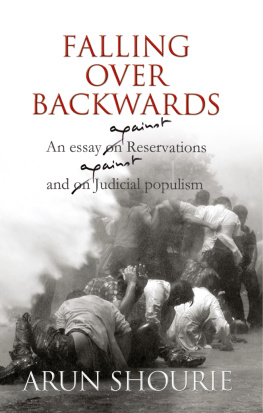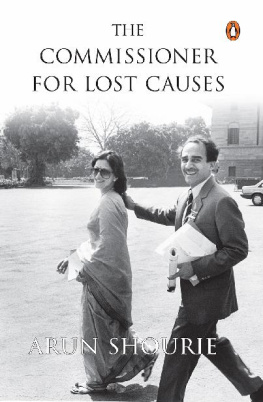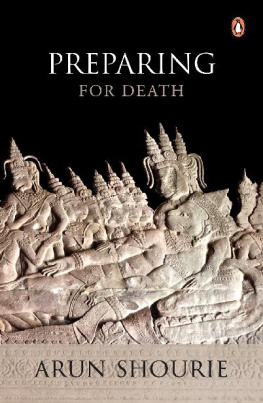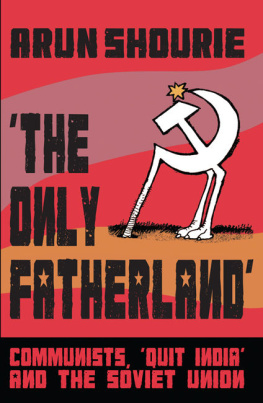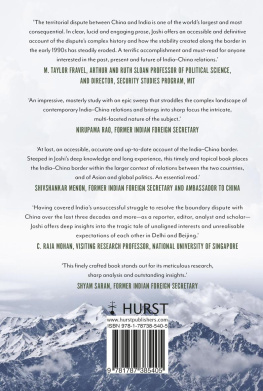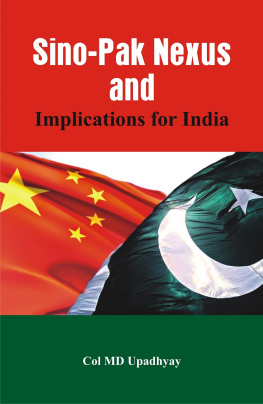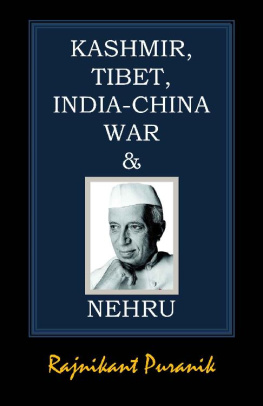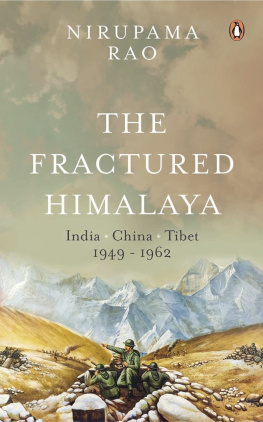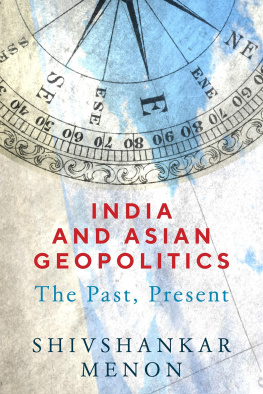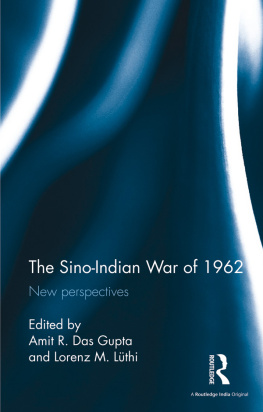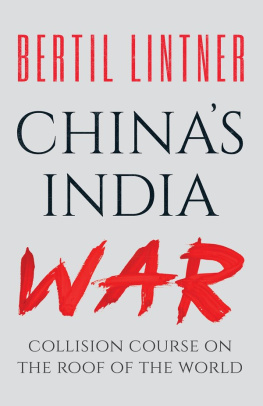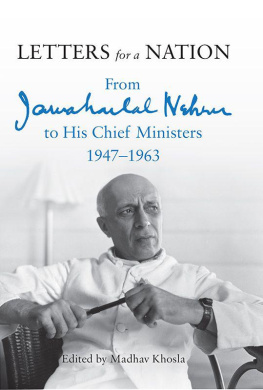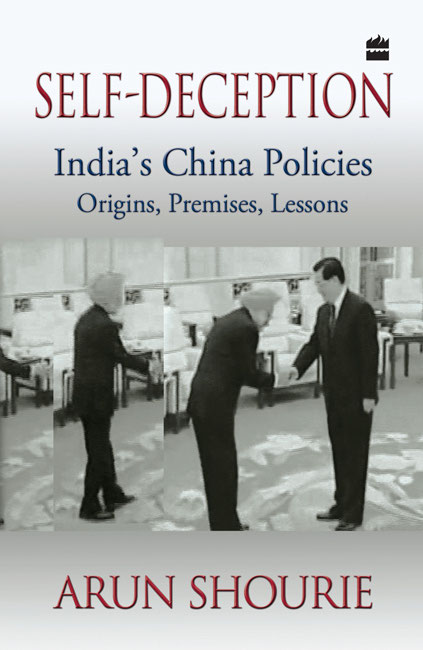SELF-DECEPTION
Indias China Policies
Origins, Premises, Lessons
ARUN SHOURIE
HarperCollins Publishers India
For
Adits angels,
Samiran Nundy, Prema Padmanabhan, Nasli R. Ichaporia,
who have kept us afloat
Contents
| Dedication |
| 1. | Bal chhutkyo bandhan padey |
| 2. | Wish as policy |
| 3. | We may have deceived ourselves |
| 4. | The policy is set |
| 5. | Anxieties are brushed aside |
| 6. | A satisfying tutorial |
| 7. | Carried away |
| 8. | Two miles this side or two miles that side |
| 9. | You didnt even know we were building a road |
| 10. | Prelude |
| 11. | These are not excuses, but merely facts |
| 12. | The avalanche |
| 13. | A roundabout thesis |
| 14. | The chasm |
| 15. | Putting our hopes in inevitability? |
| 16. | Shilpa Shetty trumps Arunachal, again |
| 17. | Understanding them, understanding what they think themselves and us to be |
| 18. | Bal hoa bandhan chhutey |
| Index |
| About the Author |
| Copyright |
A nation has security when it does not have to sacrifice its legitimate interests to avoid war, Walter Lipmann wrote long ago, and is able, if challenged, to maintain them by war.
Consider Aksai Chin: The unanimous resolution that the Parliament passed in the wake of the Chinese attack in 1962 notwithstanding, are we prepared to go to war to recover the area? Or, is it more likely that we will rationalize not going to war by giving credence to doubts: Do we have an interest in the place? Is such interest as we have in it, vital? Is it legitimate? How many of us even know that this vast expanse that China grabbed at the time is two and a half times the size of Kashmir? The only unfinished business in regard to Kashmir is to recover the part of Kashmir that Pakistan has usurpedwords of one of our prime ministers. Does anyone seriously believe that we will do anything substantive to recover any part of Pakistan-Occupied-Kashmir in any foreseeable future? What about Arunachal? Are we confident that, when challenged over it by China, we will be able to hold it by war? Is China clear on that? Building up capacities to defend our interests apart, bearing sacrifices for them apart, are we one even on what our vital, legitimate national interests are?
I remember the incident as if it were happening in front of me, just at this moment. Not long ago, at the India International Centre, during a discussion on Indias Tibet and China policy as part of the release of the original edition of this book, a commentatora prominent fixture at discussions on China, on defencesaid, I am a south Indian, for heavens sake. I have not grown up with this feeling of Delhi being the centre of things. How does what happens to Tibetans concern us? If the Tibetans want to strive for their independence, good luck to them; let them do so on their own. Why should we allow ourselves to be dragged into their problem? Indeed, I have heard the same sort of dismissive righteousness on KashmirThe fellows want to go? Let them go, for heavens sake. Let them go and suffer for their sins. That will teach them a lesson. Five years later, the same analyst was holding forth on television. We should reach out and get the Chinese to invest in India, he declaimed. They will then have a stake in India. They are the only ones who have the money. They can build our infrastructure like no one else can
Nor is there any shortage of analysts like him in regard to our border with Tibet and China. They are suffused with a unilateral objectivity, espousing which is taken as the hallmark of independent thinking in India. Books have been put out showing how in regard to Aksai Chin, for instance, the Indian borders were successively advanced northwards and eastwards by British surveyors in late nineteenth and early twentieth century. That the Chinese have similarly enlarged the entire concept of China is not mentioned at all: is it not a fact that the original China was only one-third of what China is today? I hear similar objectivity in regard to the eastern border, in particular in regard to Tawang. This cannot but dissipate national resolve; it cannot but further expose Tibetans to Chinese oppression; and it cannot but ultimately endanger India.
And there is unilateral silence too: China conveniently shifts its statements on Jammu and Kashmir as its calculations change; but we must never whisper a word about the true position of Tibet in history; we must not whisper a word about what the Chinese are doing to beat down Tibetans; we must stick to Article 370, but not say a word about how the Chinese are systematically reducing Tibetans to a minority within Tibetand the Uyghur within Xinjiang, as the Mongols have already been reduced to a helpless minority within Inner Mongolia. The Dalai Lama must not be seen anywhere near an official function. No official functionary must be seen attending any function that has to do with the Dalai Lamalest the Chinese
Recall what happened in 2008.
The brutalthe customarily brutalway in which the Chinese government suppressed the protests by Tibetans in Lhasa in the months preceding the 2008 Beijing Olympics once again drew attention to the enormous crime that the world has refused to see: the systematic way in which an entire people have been reduced to a minority in their own land; the cruelty with which they are being crushed; the equally systematic way in which their religion and ancient civilization are being erased. Protests by Tibetans in different cities across the world, joined as they were by large numbers of citizens of those countries, had the same effect.
No government anywhere in the world did what the Manmohan Singh government did in Delhi, no government reacted in as craven and as frightened a manner as our government did. The Olympic Torch was to be relayed across just about two kilometresfrom Vijay Chowk to India Gate. The government stationed over twenty thousand troops, paramilitary personnel, policemen and plainclothes men in and around that short stretch. Tibetan refugees were beaten and sequestered. Government offices were closed. Roads were blocked. The Metro was shut down. Even members of Parliament were stopped from going to their homes through the square that adjoins Parliament, the Vijay Chowk.
Do you think that any of this was done out of love for the Olympics?
It was done out of fear of China.
Dread as policythat is all such steps are. But, of course, there is the rationalization, rather a premise: that if only we conduct ourselves properly, the dragon will turn vegetarian.
On every issuethe WTO, economic liberalization, terrorism, Maoist violence, Arunachal, death for rapists, even for terrorists, name itthe pattern of discourse leaves the people feeling that there are two sides to the question: call X knowing that he is for a step, call Y knowing that he is against it; have each interrupt the other, interrupt both. The debate done, rush to the next breaking news. As every issue has two sides, where is the reason to act, to bear sacrifice? In a word, by the pattern of discourse itself, to say nothing of the doings of governments and the political class as a whole, national resolve is scattered. The consequences erupt every other week. And every time, the same sequence is played out.


